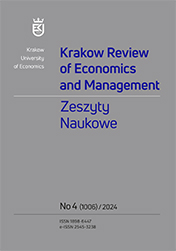Implications of Remote Working for Employees in the IT Services Sector: Experience of Polish Employees and Managers
DOI:
https://doi.org/10.15678/krem.9743Słowa kluczowe:
remote working, dispersed team, IT project management, job performance, home office, homeworkingAbstrakt
Objective: Analysis of long-term implications of remote working for employees in the IT services sector from the perspective of Polish managers and employees. The aim of the research undertaken in this article is to identify various threats that result from the implementation of remote work in organisations.
Research Design & Methods: The theoretical part presents the issue of remote working, taking into account the challenges of its implementation, at different levels and in different dimensions (organisational, managerial, social). The empirical part presents the findings of the research carried out on a group of employees in the IT services sector and on a group of managers responsible for recruitment and management of work within IT project teams.
Findings: The findings show a number of negative consequences in terms of efficiency, effectiveness of task performance, trust building and, above all, exchange of knowledge and broadly understood learning among employees, which will lead to the worsening of problems with recruiting new IT staff in Poland in the long term.
Implications / Recommendations: Remote work will generate many new problems in the IT services sector.
Contribution: The article fills a gap in the literature regarding remote working in the IT services sector, which is the youngest, but at the same time the most rapidly developing sector in Poland, showing a tendency for further intensive growth.
Pobrania
Bibliografia
Al-Rfou, A. N. (2021). Remote Working Environment Challenges in the Context of the COVID-19 Pandemic. Journal of Asian Business Strategy, 11(2), 95–103. https://doi.org/10.18488/journal.1006.2021.112.95.103 DOI: https://doi.org/10.18488/journal.1006.2021.112.95.103
Bloom, N., Liang, J., Roberts, J., & Ying, Z. J. (2015). Does Working from Home Work? Evidence from a Chinese Experiment. The Quarterly Journal of Economics, 130(1), 165–218. https://doi.org/10.1093/qje/qju032 DOI: https://doi.org/10.1093/qje/qju032
Coffey, R., & Wolf, L. (2018). The Challenge and Promise of Remote Work. A Brief Study of Remote Work and Best Practices. Leadership Computing Facility, Argonne National Laboratory. DOI: https://doi.org/10.2172/1487022
Deloitte, Worldwide ERC. (2021). Remote Work: The Road to the Future. Transformation of the Global Workforce. Retrieved from: https://www2.deloitte.com (accessed: 10.03.2023).
Eriksson, E., & Petrosian, A. (2020). Remote Work. Transitioning to Remote Work in Times of Crisis. Umea University, Umea School of Business, Economics and Statistics.
Ferrara, B., Pansini, M., De Vincenzi, C., Buonomo, I., & Benevene, P. (2022). Investigating the Role of Remote Working on Employees’ Performance and Well-being: An Evidence-based Systematic Review. International Journal of Environmental Research and Public Health, 19(19), 12373. https://doi.org/10.3390/ijerph191912373 DOI: https://doi.org/10.3390/ijerph191912373
Hertz, N. (2022). Stulecie samotnych. Jak odzyskać utracone więzi. Burda Media Polska.
Iskierka, S., Krzemiński, J., & Weżgowiec, Z. (2017). Zapotrzebowanie rynku pracy na informatyków a praktyka dydaktyczna. Dydaktyka Informatyki, 12, 33–42. https://doi.org/10.15584/di.2017.12.4 DOI: https://doi.org/10.15584/di.2017.12.4
Jung, J. (2016). Destruktywny wpływ informatyków na rynek pracy z perspektywy nowych zjawisk na rynku pracy zawodów kreatywnych. Roczniki Kolegium Analiz Ekonomicznych SGH, 40.
Kardaszewicz, J. (2011). Wykorzystanie pracowników zdalnych w firmach IT z sektora MMSP (mikro-, małych i średnich przedsiębiorstw). Zarządzanie Zmianami: Zeszyty Naukowe, 3, 46–64.
Kowalski, G., & Ślebarska, K. (2022). Remote Working and Work Effectiveness: A Leader Perspective. International Journal of Environmental Research and Public Health, 19(22), 15326. https://doi.org/10.3390/ijerph192215326 DOI: https://doi.org/10.3390/ijerph192215326
Łukasik, K., Strzelecki, J., Śliwowski, P., & Święcicki, I. (2022). Ilu specjalistów IT brakuje w Polsce? Polski Instytut Ekonomiczny.
McTaggart, V., & McLaughlin, C. (2020). Remote Working the New Reality. Paper presented at 14th European Institute for Advanced Studies in Management Colloquium on Organisational Change and Development, Brussels, Belgium.
Mitrus, L. (2020). Praca zdalna de lege lata i de lege ferenda – zmiana miejsca wykonywania pracy czy nowa koncepcja stosunku pracy? Część 1. Praca i Zabezpieczenie Społeczne, 61(10), 3–9. https://doi.org/10.33226/0032-6186.2020.10.1 DOI: https://doi.org/10.33226/0032-6186.2020.10.1
Moczydłowska, J. M. (2021). Nowe trendy na rynku pracy – praca w systemie home office w percepcji polskich menedżerów. Marketing i Rynek, 28(4), 18–26. https://doi.org/10.33226/1231-7853.2021.4.3 DOI: https://doi.org/10.33226/1231-7853.2021.4.3
Obłój, K. (2022). Myśl strategicznie! Jak przygotować i zmieniać organizację w odpowiedzi na wyzwania otoczenia. Poltext.
Oliver, J. (2021). How Remote Work Is Shaking up the U.S. Workforce: Research on the Recent Shift to Remote Work. Finance Undergraduate Honors Theses. Retrieved from: https://scholarworks.uark.edu/finnuht/61 (accessed: 7.03.2023).
Parker, S. K., Knight, C., & Keller, A. (2020). Remote Managers Are Having Trust Issues. Harvard Business Review. Retrieved from: https://hbr.org/2020/07/remote-managers-are-having-trust-issues (accessed: 5.03.2023).
Sobczak, A. (2021). Praca zdalna w warunkach pandemii COVID-19. Problemy efektywności i nierówności społecznych. Wychowanie w Rodzinie, 24(1), 147–159. https://doi.org/10.34616/wwr.2021.1.147.159 DOI: https://doi.org/10.61905/wwr/170404
Sokolic, D. (2022). Remote Work and Hybrid Work Organizations. 78th International Scientific Conference on Economic and Social Development, Aveiro, 24–25 February (Book of Proceedings).
Taboroši, S., Strukan, E., Poštin, J., Konjikušić, M., & Nikolić, M. (2020). Organizational Commitment and Trust at Work by Remote Employees. Journal of Engineering Management and Competitiveness, 10(1), 48–60. https://doi.org/10.5937/jemc2001048T DOI: https://doi.org/10.5937/jemc2001048T
Taleb, N. N. (2014). Czarny Łabędź. O skutkach nieprzewidywalnych zdarzeń. Kurhaus Publishing Kurhaus Media.
Vanson Bourne. (2022). The Distributed Work Dilemma: When Innovation and Job Satisfaction Compete. Retrieved from: https://www.vmware.com (accessed: 3.03.2023).
Wieszczycka, W. (2014). Rozwój polskiego sektora IT w okresie spowolnienia gospodarczego. Kwartalnik Naukowy Uczelni Vistula, 2, 124–142.
Woźniak-Jęchorek, B. (2022). Czynniki determinujące udział pracy zdalnej w całkowitym zatrudnieniu. Studia BAS, 1, 29–47. https://doi.org/10.31268/StudiaBAS.2022.03 DOI: https://doi.org/10.31268/StudiaBAS.2022.03
Yang, L., Holtz, D., Jaffe, S., Suri, S., Sinha, S., Weston, J., Joyce, C., Shah, N., Sherman, K., Hecht, B., & Teevan, J. (2022). The Effects of Remote Work on Collaboration among Information Workers. Nature Human Behaviour, 6, 43–54. https://doi.org/10.1038/s41562-021-01196-4 DOI: https://doi.org/10.1038/s41562-021-01196-4
Pobrania
Opublikowane
Numer
Dział
Licencja
Prawa autorskie (c) 2024 Uniwersytet Ekonomiczny w Krakowie

Utwór dostępny jest na licencji Creative Commons Uznanie autorstwa 4.0 Międzynarodowe.

